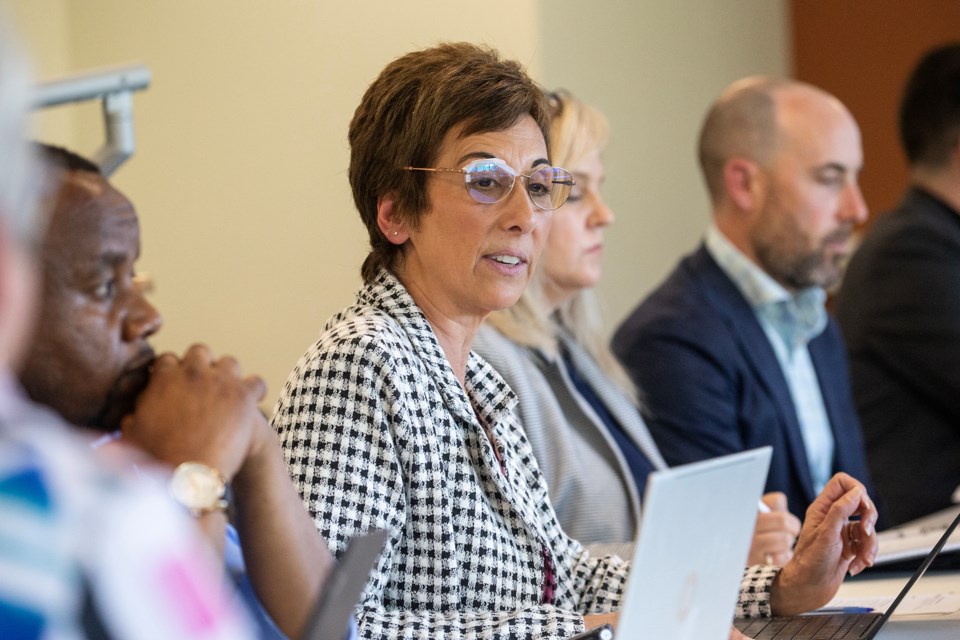A vote of no confidence against Algoma University president Asima Vezina by a group representing full-time faculty at the institute did not come up as a topic of discussion at Thursday's meeting of the board of governors, but a representative of that board says it stands in support of her despite the criticism of her leadership.
The vote was held on June 7 by the Algoma University Faculty Association members during a meeting of full-time faculty. The results of the vote were shared with media on Thursday in a move the association admits is a "drastic measure."
The association, which represents 73 full-time faculty at the university, accuses Vezina of prioritizing profit-making over the interest of students through the rapid, unmanageable growth of international student enrolment, causing damage to the university's reputation.
Just prior to Thursday's meeting, board chair Mike Moraca issued a written statement to media by email in response to the accusations.
"Algoma University’s board of governors has full confidence in the president and senior leadership of the university," he wrote. "We will use this protest as an opportunity to engage in meaningful dialogue with all our faculty to find more ways to help them support students and engage in impactful research."
He alleged the Canadian Association of University Teachers has been encouraging non-confidence votes against university presidents and administrators at institutions across the country.
"However, Algoma University is financially stable," he said. "We are hiring new full-time faculty, and investing in academic programming, facilities and students. While we recognize the right to peaceful acts of protest, we believe Algoma is in a strong position to continue to help students succeed."
The board of governors is responsible for the government, conduct, management and control of the university and its property, while the Senate — which is comprised of representatives from the full-time and part-time faculty, the administration, the staff, the students, the board of governors and the Anishinaabe People’s Council — is responsible for the educational policy of the university.
The vote of no confidence was not mentioned during Thursday's board meeting and Vezina declined an opportunity to speak to media about it after the open portion of the meeting.
Alice Ridout, spokesperson for the association, said the process of attempting to get management to listen began in September with a letter of concern to the board and president sent by the department chairs.
"At that time we didn't hear anything from the board," Ridout said of the September letter. "That was disappointing and we've just been working really hard all year to try to change direction and address the issues and just not hearing that from our president. It's been a frustrating year, that's for sure."
In January, Algoma U's Brampton campus faced protests after a large number of international students failed a course in the computer science program. In an annual report to the Senate made by the Academic Standards and Appeals Committee, it was reported the number of academic appeals has increased dramatically in 2023/24 over the previous academic year.
"The high number of student failures in particular courses this past winter, and the concomitant increase in student appeals, led to two decisions that the Committee finds troubling," said the report.
The first decision concerned the student protests that erupted after almost 100 students at the university's Brampton campus did not achieve a passing grade in the Techniques of Systems Analysis class within the Graduate Certificate in Information Technology program.
In a Jan. 10 SooToday story about the incident, a university spokesperson said a bell curve was applied to the course, resulting in 61 of those students achieving a passing grade. The remaining 32 students who continued to have a failing grade were offered a make-up examination and an opportunity to challenge their grade.
"No Algoma University student has been given an improved grade as a result of a protest or a meeting,” the university said at the time.
In its report to Senate, the committee said those changes were applied retroactively, after students had received final grades.
"Members of the Committee are concerned by group changes in course grades, and believe that this should be avoided in future courses," the committee said in the report.
The second decision concerning the committee was in relation to a backlog of grade appeals it faced, and how the university responded to them.
"Administration intervened, and decided that a number of cases from Spring 2023 that had not been deliberated in a reasonable time should be settled in students’ favour — simply to clear the backlog," said the report. "Committee members strongly believe that interventions of this kind should also be avoided for future appealed cases."
The report said it is important for the university to uphold academic standards and academic integrity and for the university to put systems and procedures in place to ensure that these problems can be prevented, rather than dealt with in a reactive fashion.
The association was seeking to attend Thursday's meeting of the board of governors but claims that request was declined.
